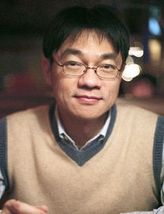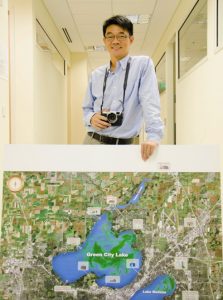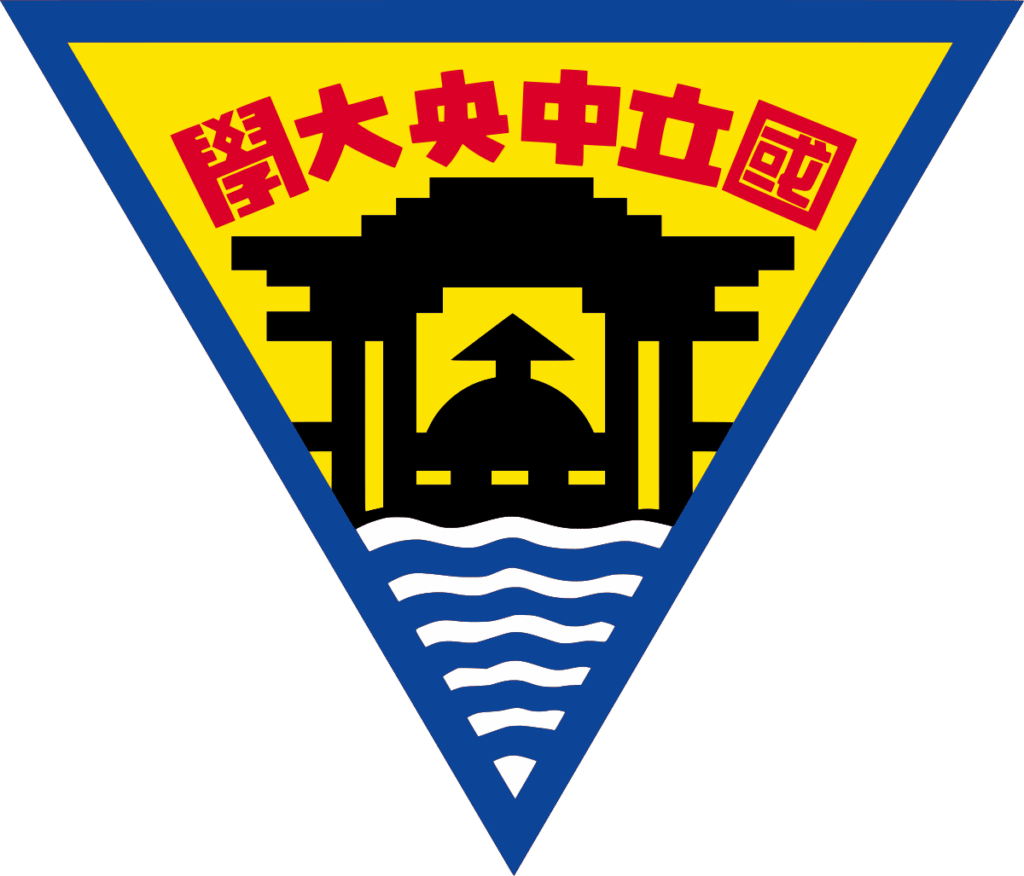
詹明峰 副教授
Ming-Fong Jan, Associate Professor
(03) 4227151 ext 33860
mingfongjan@gmail.com
PhD, Curriculum & Instruction,
University of Wisconsin-Madison)

Mingfong & Green City Blues game board at the Learning Sciences Lab, Singapore
簡歷
詹明峰博士任職於國立中央大學,在學習與教學研究所暨師資培育中心擔任專任副教授。回國任職之前,他是新加坡南洋理工大學 (Nanyang Technological University, Singapore)國立教育學院(National Institute of Education)學習科學研究所(Learning Sciences Lab)的學習科學家,並擔任教育研究中心 (Office of Education Research) 學習科學(Learning Sciences & Pedagogy) 與遊戲學習(Play and Game-based Learning)兩個學門召集人,及新加坡未來學校(Future School)遊戲學習顧問。
詹博士在美國威斯康辛大學麥迪遜分校(University of Wisconsin-Madison)取得課程與教學(Curriculum & Instruction)博士,副修學習學(the learning sciences),對於設計研究法(design-based research)與質性研究(qualitative research)多有著墨。他師從Kurt Squire, James Paul Gee, David Williamson Shaffer, Richard Halverson, Constance Steinkuehler, Michael Thomas, Michael Streibel 等質性研究、學習學、與遊戲學習先驅,並與哈佛大學學習科技教授Chris Dede 與MIT師資培育中心教授Eric Klopfer 合作設計擴增實境教育遊戲,是國內最早投入遊戲學習研究的學者之一,同時也是威斯康辛大學遊戲學習與社會(Games, Learning and Society) 研究社群的創始成員。
詹博士從社會、文化與認知的角度來探究學習,以學習學(the learning sciences)和設計研究法(design-based research)為主要教育研究工具,來了解如何創新學習與教學的文化,特別是(1)教師作為學習經驗設計師, (2)設計思考與協同問題解決,(3)素養(21st century literacies)導向課程設計與學習評量,(4)教育桌遊與協同論證/探究。
詹博士積極與學術界、教育界合作,在設計思考、跨領域課程設計、素養導向學習評量、以素養為學習目標的教育桌遊設計、職前與現職教師專業發展、創新教學法(如翻轉教室、合作學習與小組討論方法等等)著墨甚多,也透過超過100場的學術演講、教師工作坊、家長工作坊、互動討論、遊戲式教學等,來設計與推動新的教育文化。
加入中央大學兩年多後,他獲得中央大學106學年度教學傑出獎,中央大學最高教學獎項。
Bio (290 words)
Academic positions
Dr. Mingfong JAN (詹明峰) is an Associate Professor at the Graduate Institute of Learning and Instruction (學習與教學研究所), National Central University, Taiwan. Previously, he was a Research Scientist at the Learning Sciences Lab, National Institute of Education (NIE), Nanyang Technological University in Singapore, where he served as a research convenor in two research areas at the Office of Education Research (OER): Play/Game-based Learning and the Learning Sciences & Pedagogy. He has been a member/researcher of the Games, Learning and Society research group at the University of Wisconsin-Madison since its inauguration in 2005.
Research foci
Dr. Jan graduated from the University of Wisconsin-Madison with a PhD degree from Curriculum & Instruction (ranked No. 1 in the US based on US News and World Report). As a learning scientist, he employs a design-based research approach and sociocultural perspectives to transform teaching and learning cultures, especially through the following research areas: teachers as learning experience designers, design thinking and collaborative problem-solving, learning with games and gamified activities, and 21st century literacies (e.g., argumentation and collaboration). He is a winner and candidate for best paper awards in AECT-ICFER and ICCE conferences.
Teaching
Dr. Jan is known as an expert in Design Thinking, Teachers’ Professional Development, Curriculum and Instruction, and Learning with Games. He designed many games, game-based curricula, and gamified learning activities to foster student learning and teacher education. His courses are known for engaging students in deep thinking and reflection. Since joining NCU, he has conducted more than 100 talks and workshops for students, parents, teachers, and faculties.
In 2017, he won Teaching Excellence Award at National Central University–the most prestigious teaching award in NCU.
Biography (elaborated)
Taiwan
Dr. Mingfong JAN is an Associate Professor at the Graduate Institute of Learning and Instruction, National Central University, Taiwan.
Singapore
As a Research Scientist at the Learning Sciences Lab (National Institute of Education, Nanyang Technological University, Singapore), I led several research projects in game-based learning and new media studies while teaching graduate courses. I served as a research convenor leading research programs in Play/Game-based Learning (2014~2015) and in Learning Sciences and Pedagogy (2013). To enhance the impacts of games on learning, I also served as a consultant in game-based learning for Singapore’s Future Schools and a collaborator with the Educational Technology Division at the Ministry of Education, Singapore.
Madison, Wisconsin (United States)
As a PhD student at the University of Wisconsin-Madison (Curriculum & Instruction), I played an important role in Handheld Augmented Reality Games for Education initiatives, in which he worked with MIT (Dr. Eric Klopfer of the MIT Scheller Teacher Education Program) and Harvard (Dr. Chris Dede of Graduate School of Education) to develop AR games and curricula, under the supervision of Dr. Kurt Squire. I have designed and co-designed more than 10 AR games, card games, and game-based curricula.
Education
PhD
I received my PhD degree from the Curriculum and Instruction Department (ranked #1 in the US ) at the University of Wisconsin-Madison. My PhD minor is the Design of Interactive Learning Environments, which is comprised of major coursework from the Learning Sciences area at the Educational Psychology Department (ranked #1 in the US).
As a graduate researcher, I was supervised (and inspired) by Dr. Kurt Squire and mentored by a group of dedicated educators such as James Paul Gee, David Williamson Shaffer, Constance Steinkuehler, Richard Halverson, Michael Thomas, Michael Streibel and Gloria Ladson-Billings.
PhD Dissertation
Designing an Augmented Reality Game-Based Curriculum for Argumentation
In collaboration with MIT and Harvard University on designing handheld augmented reality (AR) games for learning, my PhD dissertation pioneers the design of handheld augmented reality games for argumentation skills.
MA & BA
I received my BA in English at Fu-Jen Catholic University (Taiwan) and MA in Western Literature and Languages at Tamkang University (Taiwan).
The love for literature and humanity fuels my inspiration and aspiration for a deeper understanding of human nature and culture through education.
112-2
教學與學習科技素養 (Literacy of Learning and Instructional Technology)
自然領域探究與實作 (Inquiry-based and Hands-on Learning in Natural Sciences)
112-1
學習與教學導論 (Introduction to Learning and Instruction)
科技與教學整合專題研究 (Teaching and Learning Innovation with Technology)
教學與學習科技素養 (Literacy of Learning and Instructional Technology)
111-2
自然領域探究與實作 (Inquiry-based and Hands-on Learning in Natural Sciences)
科技與教學整合專題研究 (Teaching and Learning Innovation with Technology)
111-1
自然領域探究與實作 (Inquiry-based and Hands-on Learning in Natural Sciences)
書報討論 (Seminar)
教學與學習科技素養 (Literacy of Learning and Instructional Technology)
110-2
自然領域探究與實作 (Inquiry-based and Hands-on Learning in Natural Sciences)
科技與教學整合專題研究 (Teaching and Learning Innovation with Technology)
110-1
新興教育議題 (Emerging Education Issues)
學習與教學導論 (Introduction to Learning and Instruction)
109-2
自然領域探究與實作 (Inquiry-based and Hands-on Learning in Natural Sciences)
科技與教學整合專題研究 (Teaching and Learning Innovation with Technology)
109-1
書報討論 (Seminar)
教育實習 (Educational Practice)
計畫:
2021-2024: 教中學: 社會學習網絡支援教中學策略設計、評估與推廣 (Teach to Learn (T2L): Social Learning Networking Supported T2L Design, Evaluation, and Outreach) (MOST 110-2511-H-008-005-MY3)
2018-2021: 社會學習網絡之自動化知識關聯分析及建構 (Social Learning Networking Driven Automatic Knowledge Process and Association) (MOST 107-2511-H-008 -006 -MY3)
2016-2018: 關聯式設計策略:概念知識雲及其社會學習網絡之建置 (Relational-Based Approach: Concept-Knowledge Cloud and Its Social Learning Networking Development) (MOST 105-2511-S-008 -007 -MY2)
2013-2016: 基於教室學習網絡設計之遊戲化 Apps 及其人因分析 (Classroom Learning Network Based Gamification Apps Design and Its Human Factors Analysis) (MOST 102-2511-S-008 -019 -MY3)
2012: 從認知風格探討科技學習工具介入之群組式數位學習環境之影響 (The Effects of Cognitive Styles on the Use of Novel Portable Devices: A Perspective of Group-Based Learning) (MOST 101-2511-S-415-016-)
2010 – 2011: 教室中多人共用一機之競爭學習情境設計及學生喜好性分析 (Understanding Students’ Competition Preference in Multiple-Mice Supported Classroom) (99-2511-S-415-006-MY2)
論文:
30. Chin, J., Chang, B., & Shih, Y. A. (2023). Digital visual grammar concept map facilitated EFL holistic grammar comprehension. Journal of English Language Teaching, 10(1), 104-121. Doi: http://dx.doi.org/10.26858/eltww.v10i1.44939
30. Zendrato, R., Chang, B., & Cheng, H. (2023). Enhancing foreign workers’ online learning interaction strategy: An action research in Indonesia Open University Taiwan. Asian Journal of Distance Education, 18(1), 238-256. Doi: https://doi.org/10.5281/zenodo.7863420
29. Looi, C. K., Wong, S. L., Kong, S. C., Chan, T. W., Shih, J. L., Chang, B., Wu, Y. T., Liu, C. C., Yeh, C. Y. C. Chen, Z. H., Chien, T. C., Chou, C. Y., Hung, H. C., Cheng, H. & Liao, C. C. Y. (2023). Interest-driven creator theory: Case study of embodiment in an experimental school in Taiwan. Research and Practice in Technology Enhanced Learning (RPTEL), 18, 23. DOI: https://doi.org/10.58459/rptel.2023.18023
28.Shih, YA., & Chang, B. (2020). Empirical study on the effects of social network–supported group concept mapping. RPTEL 15, 23 (2020). https://doi.org/10.1186/s41039-020-00143-7
27.Shih, Y., Chang, B., & Chin, J. Y. (2020). Data-driven student homophily pattern analysis of online discussion in a social network learning environment. Journal of Computers in Education, 7, 373-394. doi: https://doi.org/10.1007/s40692-020-00160-x
26.Chan, T. W., Looi, C. K., Chang, B., Chen, W., Wong, L. H., Wong, S. L., … Chou, C. Y. (2019). IDC theory: Creation and the creation loop. RPTEL 14, 26. doi:10.1186/s41039-019-0120-5
25.Chan, T. W., Looi, C. K., Chen, W., Wong, L. H., Chang, B., Liao, C. C. Y., … Ogata, H. (2018). Interest-driven creator theory: towards a theory of learning design for Asia in the twenty-first century. Journal of Computers in Education, 5(4), 435-461.
24.Chang, B., Shih, Y. A., & Lu, F. C. (2018). Co-construction concept through cloud-based social network platform design, implementation, and evaluation. The International Review of Research in Open and Distributed Learning, 19(5), 238-253. (SSCI) doi: http://dx.doi.org/10.19173/irrodl.v19i5.3419
23.Chang, B., & Lu, F. C. (2018). Social media facilitated English prewriting activity design and evaluation. The Asia-Pacific Education Researcher, 27(1), 33-42. (SSCI) doi: 10.1007/s40299-017-0363-0
22.Yu, F. Y., Hsieh, H. T., & Chang, B. (2017). The potential of Second Life for university counseling: A comparative approach examining media features and counseling problems. Research and Practice in Technology Enhanced Learning.12:24. doi: 10.1186/s41039-017-0064-6
21.Chang, B., Chen, S., Tsai, Y. C., & Lai, M. L. (2016). The effects of task activities and gaming scales on eye and visual search performance. Computers in Human Behavior, 66, 16-25. (SSCI)
20.Yang, E. F. Y., Chang, B., Cheng, H. N. H., & Chan, T. W. (2016). Improving pupils’ mathematical communication abilities through computer-supported reciprocal peer tutoring. Educational Technology & Society, 19(3), 157-169. (SSCI)
19.Lu, F. C., & Chang, B. (2016). Role-play game enhanced English for specific purpose vocabulary acquisition framework. Educational Technology & Society, 19(2), 367-377. (SSCI)
18.Wang, J. H., Chen, S. Y., Chang, B., & Chan, T. W. (2016). From integrative peer response to game-based integrative peer response: High ability vs. low ability. Journal of Computer Assisted Learning, 32(2), 170-185. (SSCI)
17.Cheng, H. N. H., Yang, E. F. Y., Liao, C. C. Y., Chang, B., Huang, Y. C. Y., & Chan, T. W. (2015). Scaffold seeking: A reverse design of scaffolding in computer-supported word problem solving. Journal of Educational Computing Research, 53, 409-435. (SSCI)
16.Chang, B., Chen, S., & Jhan, S.N. (2015). The influences of an interactive group-based videogame: Cognitive styles vs. prior ability. Computers & Education, 88, 399-407. (SSCI)
15.Chuang, M. T., Chang, B., & Chen, H. C. (2014). Investigating reported social and affective strategy used by EFL learners in virtual and real learning environments. International Journal of Applied Linguistics & English Literature, 3(2), 27-33.
14.Chang, B., Yu, F. Y., Chen, Y. Y., & Hsieh, H. T. (2013). Thinking in an opposing position: A framework design of role-reversal pedagogy through technology. Research and Practice in Technology Enhanced Learning, 8(3), 347-362.
13.Chang, B., Chuang, M. T., & Ho, S. (2013). Understanding students’ competition preference in multiple-mice supported classroom. Educational Technology & Society, 16(1), 171-182. (SSCI)
12.Yu, F. Y., Hsieh, H. T., & Chang B. (2011). Potential of second life for psychological counseling: A comparative approach. Lecture Notes in Computer Science, 6872, 44–45. (EI)
11.Chang, B., Wang, H. Y., Peng, T. Y., & Hsu, Y. S. (2010). Development and evaluation of a city-wide wireless weather sensor network. Educational Technology & Society, 13(3), 270-280. (SSCI)
10.Elwell, M., & Chang, B. (2010, January). Mission-oriented situated second language learning in Second Life. IEEE Learning Technology Newsletter, 12(1), 62-65.
9.Chang, S. B., Lin, C. J., Ching, E., Cheng, H. N. H., Chang, B., Chen, F. C., … Chan, T. W. (2009). EduBingo: Developing a content sample for the one-to-one classroom by the content-first design approach. Educational Technology & Society, 12(3), 343-353. (SSCI)
8.Wang, H. Y., Chang, B. & Harn, C. T. (2009, July). Using mobile data logger and city-wide weather database to facilitate parent-child coupled climatology learning. IEEE Learning Technology Newsletter, 11(3), 4-6.
7.Chang, B., Wang, H. Y. & Lin, Y. S. (2009, January-April). Enhancement of mobile learning using wireless senor network. IEEE Learning Technology Newsletter, 11(1&2), 22-25.
6.Chang, B., Cheng, N. H., Deng, Y. C. & Chan, T. W. (2007). Environmental design for a structured network learning society. Computers and Education, 48(2), 234-249. (SSCI, EI)
5.Liang, J. K., Liu, T. C., Wang, H. Y., Chang, B., Deng, Y. C., Yang, J. C., Chou, C. Y., Ko, H. W., Yang, S., & Chan, T. W. (2005). A few design perspectives on one-on-one digital classroom. Journal of Computer-Assisted Learning, 21(3), 181-189. (SSCI)
4.Chang, L. J., Chou, C. Y., Chen, Z. H., & Chan, T. W. (2004). An approach to assisting teachers in building physical and network hybrid community-based learning environments: The Taiwanese experience. Journal of Educational Development, 24(4), 361-381. (SSCI)
3.Chang, L. J., Yang, J. C., Deng, Y. C., & Chan, T. W. (2003). EduXs: Multilayer educational services platforms. Computers & Education, 41(1), 1-18. (SSCI, EI)
2.Chang, L. J., Yang, J. C., Yu, F. Y., & Chan, T. W. (2003). Development and evaluation of multiple competitive activities in a synchronous quiz game system. Journal of Innovations in Education and Training International, 40(1), 16-26. (SSCI)
1.Yu, F. Y., Chang, L. J., Liu, Y. H., & Chan, T. W. (2002). Learning preferences and satisfaction of senior high school students toward different sunchronized computerized competitive modes. Journal of Computer-Assisted Learning, 18(3), 341-350. (SSCI)
